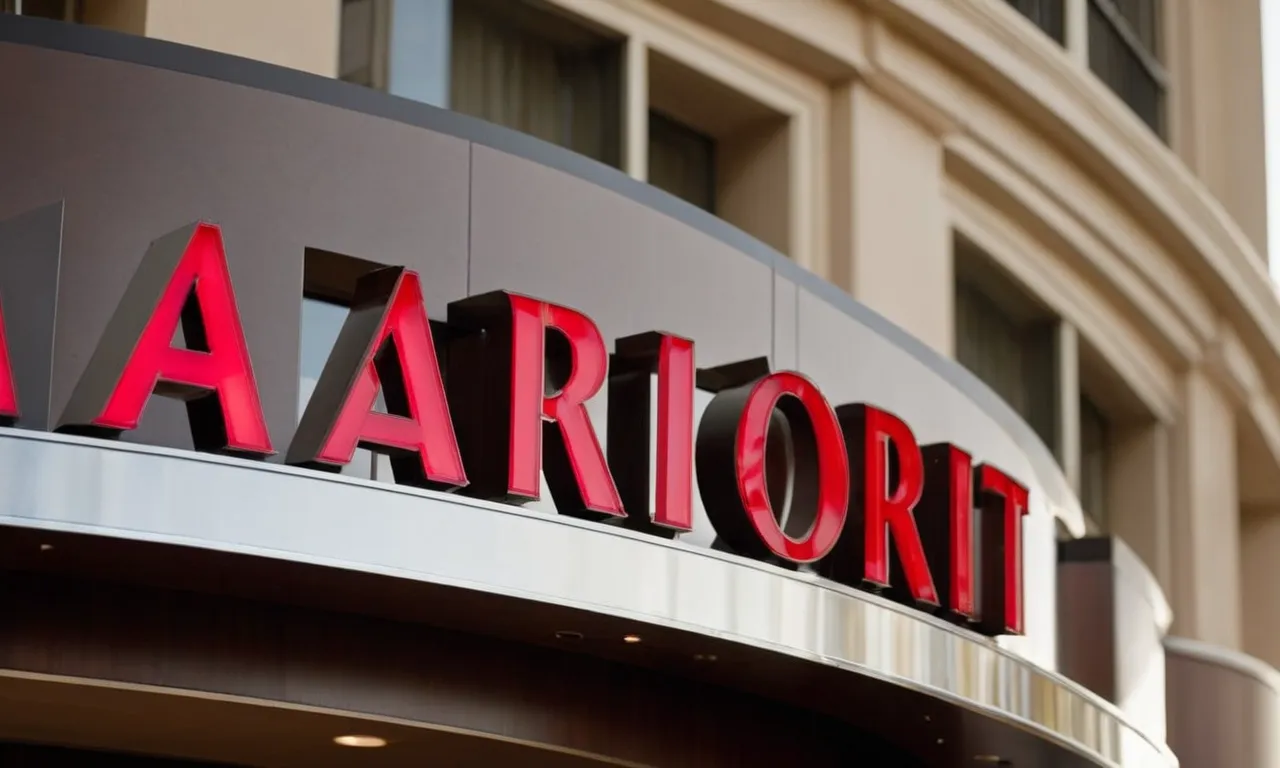Are Marriott Hotels Privately Owned? A Comprehensive Guide
When it comes to the world of hospitality, few names carry as much weight as Marriott. This iconic brand has become synonymous with luxury, comfort, and exceptional service, catering to travelers from all walks of life. However, the question that often arises is: are Marriott hotels privately owned?
If you’re short on time, here’s a quick answer to your question: Marriott International, Inc. is a publicly-traded company, but many of its individual hotels are owned and operated by private entities or franchisees.
In this comprehensive article, we’ll delve into the intricate ownership structure of Marriott hotels, exploring the various models employed by the company, and shedding light on the nuances that make this global hospitality giant a unique and fascinating entity.
The Marriott International Umbrella
Marriott International is a renowned global hospitality company that operates a vast portfolio of hotel brands across the globe. While many travelers are familiar with the iconic Marriott Hotels brand, the company’s reach extends far beyond its namesake properties.
At the heart of this expansive empire lies Marriott International, the parent company that oversees a diverse range of hotel brands and franchises.
Understanding the Parent Company
Marriott International, Inc., headquartered in Bethesda, Maryland, is a publicly-traded company listed on the NASDAQ stock exchange. Founded in 1927 by J. Willard and Alice Marriott, the company has grown from a humble root beer stand into a global hospitality powerhouse.
With a market capitalization of around $52 billion as of 2022, Marriott International boasts a portfolio of over 8,000 properties across 139 countries and territories, employing approximately 700,000 people worldwide.
Marriott’s Diverse Brand Portfolio
One of the key strengths of Marriott International is its diverse brand portfolio, catering to a wide range of travelers and preferences. From luxury resorts to affordable extended-stay hotels, the company offers a variety of options under different brand names, such as:
- Luxury: The Ritz-Carlton, St. Regis, The Luxury Collection
- Premium: JW Marriott, Marriott Hotels, Sheraton, Delta Hotels
- Select Service: Courtyard, Residence Inn, Fairfield Inn & Suites
- Extended Stay: TownePlace Suites, Marriott Executive Apartments
This diverse range of brands allows Marriott International to cater to different market segments and meet the varying needs of travelers worldwide.
The Franchising Model
Marriott International operates under a franchising model, where the company grants the right to independent owners and operators to use its brand names and systems in exchange for fees and a share of revenue.
According to the company’s 2021 Annual Report, approximately 98% of Marriott’s properties are franchised, allowing the company to maintain a relatively asset-light business model. This approach enables Marriott to expand its global footprint rapidly while leveraging the expertise and capital of local partners.
The franchising model also contributes to the diversity of ownership structures within the Marriott portfolio. While the parent company, Marriott International, is a publicly-traded entity, many individual hotels are privately owned and operated by franchisees who have licensed the Marriott brand and adhere to the company’s standards and guidelines.
This model allows for a blend of corporate oversight and local entrepreneurship, fostering a dynamic and diverse hospitality landscape under the Marriott umbrella 😊.
Ownership Models for Marriott Hotels
Marriott International, one of the world’s largest hotel chains, operates under various ownership models to cater to diverse market needs and preferences. The company’s portfolio encompasses a range of hotel brands, each with its unique identity and target audience.
Let’s delve into the different ownership models employed by Marriott Hotels.
Company-Owned Hotels
Marriott owns and operates a select number of hotels directly. These properties, often flagship locations or iconic addresses, are wholly owned and managed by the company. By maintaining full control over these hotels, Marriott can ensure consistent brand standards, service quality, and guest experiences.
According to Marriott’s 2022 Annual Report, approximately 5% of their hotels were company-owned as of the end of 2022.
Franchised Hotels
The franchise model is one of the most prevalent ownership structures for Marriott Hotels. In this arrangement, independent hotel owners or investors acquire the rights to operate a Marriott-branded property by paying initial and ongoing franchise fees.
Franchisees benefit from Marriott’s brand recognition, marketing support, and operational systems, while maintaining ownership and day-to-day management of the hotel. As per Marriott’s 2022 Annual Report, franchised hotels accounted for approximately 80% of their portfolio.
Managed Hotels
In the managed hotel model, Marriott provides professional management services to properties owned by third-party investors or ownership groups. These owners retain ownership of the hotel assets but rely on Marriott’s expertise in operations, marketing, and brand standards.
Marriott earns management fees based on the hotel’s performance, while the owners receive a share of the profits. According to industry reports, managed hotels made up around 15% of Marriott’s portfolio in recent years.
Joint Ventures and Partnerships
Marriott also engages in joint ventures and partnerships with other companies or investors to develop and operate hotels. These collaborative arrangements can take various forms, such as co-ownership, strategic alliances, or equity investments.
By pooling resources and expertise, Marriott can expand its reach, enter new markets, or diversify its offerings. For instance, Marriott has formed joint ventures with vacation ownership companies to offer timeshare and fractional ownership opportunities to its customers.
Marriott’s diverse ownership models allow the company to maintain a flexible and adaptable approach to hotel operations, catering to different market segments and investor preferences. By leveraging franchising, management contracts, and strategic partnerships, Marriott can expand its global footprint while maintaining brand consistency and delivering exceptional guest experiences 👏🎉.
The Benefits of Franchising for Marriott
Marriott International has embraced the franchising model as a key driver for its global expansion and success. By leveraging the power of franchising, the company has reaped numerous benefits that have propelled it to become one of the world’s leading hotel chains.
Here are some of the significant advantages that Marriott enjoys through its franchising strategy:
Rapid Expansion and Global Reach
Franchising has enabled Marriott to expand its footprint rapidly across the globe. As of 2022, Marriott operates over 8,000 properties in 139 countries and territories, with a significant portion of these hotels being franchised.
By partnering with local entrepreneurs and investors, Marriott can tap into new markets and regions without the need for extensive capital investments. This approach has allowed the company to establish a strong global presence and cater to the diverse needs of travelers worldwide.
According to Marriott’s official website, the company plans to open an additional 1,700 hotels by 2023, further solidifying its position as a global hospitality powerhouse.
Shared Costs and Risks
Franchising allows Marriott to share the costs and risks associated with hotel operations with its franchisees. Instead of shouldering the entire financial burden, the company can rely on franchisees to invest in the development, construction, and operation of hotels while providing the brand name, marketing support, and operational expertise.
This mutually beneficial arrangement enables Marriott to expand rapidly while mitigating financial risks and optimizing its resources. 😊 According to a report by FranchiseHelp, Marriott’s franchising model has contributed significantly to its profitability, with franchised hotels accounting for a substantial portion of its revenue.
Maintaining Brand Standards
One of the key advantages of franchising for Marriott is the ability to maintain consistent brand standards across its portfolio. The company has established rigorous guidelines and protocols that franchisees must adhere to, ensuring a consistent level of quality, service, and guest experience.
This commitment to brand standards has been a driving force behind Marriott’s success, as it has fostered customer loyalty and trust in the brand. Marriott provides extensive training and support to its franchisees, ensuring that they uphold the company’s values and deliver the exceptional hospitality experience that guests have come to expect.
👏 According to Entrepreneur, Marriott’s franchisees benefit from the company’s strong brand recognition, marketing support, and operational expertise, making it an attractive opportunity for aspiring entrepreneurs in the hospitality industry.
Through its franchising model, Marriott has achieved remarkable growth, risk mitigation, and brand consistency, solidifying its position as a leader in the global hospitality industry. As the company continues to expand, franchising will undoubtedly remain a cornerstone of its strategy, enabling it to reach new heights and deliver exceptional experiences to guests around the world.
The Role of Private Investors and Owners
Investment Opportunities in Marriott Hotels
Marriott International, one of the world’s leading hospitality companies, presents a unique investment opportunity for private investors and owners. With a portfolio of over 8,000 properties across 139 countries and territories, Marriott offers a diverse range of hotels, from luxurious resorts to budget-friendly accommodations.
Private investors can capitalize on the brand’s global recognition and strong market presence by investing in Marriott-branded hotels.
According to Marriott’s Investor Relations website, the company has a strong track record of delivering solid returns for its shareholders. In 2021, Marriott’s global revenue per available room (RevPAR) grew by 86.8% compared to 2020, indicating a strong recovery from the COVID-19 pandemic.
The company’s commitment to innovation and exceptional guest experiences has contributed to its success, making it an attractive investment option for those seeking long-term growth and stability.
Challenges and Considerations for Private Owners
While owning a Marriott hotel can be a lucrative endeavor, private investors and owners must also navigate through various challenges and considerations. One of the primary hurdles is the substantial capital investment required to acquire or build a Marriott-branded property.
According to industry estimates, the cost of constructing a new Marriott hotel can range from $150,000 to $500,000 per room, depending on the brand and location.
Private owners must also adhere to Marriott’s stringent brand standards and operational guidelines, which can be demanding but ultimately contribute to the brand’s consistent quality and guest satisfaction.
Additionally, staying competitive in the ever-evolving hospitality industry requires continuous investment in property upgrades, amenities, and technological advancements to meet the evolving needs and expectations of guests.
The Impact on Guest Experience
Private ownership of Marriott hotels can have a significant impact on the guest experience. When private investors and owners prioritize delivering exceptional service and maintaining high-quality standards, guests can enjoy a truly memorable stay that embodies the Marriott brand’s values of hospitality and excellence. On the flip side, if private owners fail to uphold the brand’s standards or make necessary investments, it can lead to a subpar guest experience, tarnishing the Marriott reputation.
Fortunately, Marriott has implemented robust quality control measures and auditing processes to ensure that all properties, regardless of ownership structure, meet the brand’s exacting standards. This commitment to consistency has contributed to Marriott’s strong brand loyalty and customer satisfaction ratings, with the company consistently ranking among the top hotel brands in J.D.
Power’s Hotel Guest Satisfaction Study.
Conclusion
The ownership structure of Marriott hotels is a complex tapestry woven from various threads, including the publicly-traded parent company, franchisees, private investors, and joint ventures. This intricate web allows Marriott to maintain a global presence while leveraging the expertise and resources of local partners.
Whether you’re a traveler seeking a luxurious stay, an investor exploring opportunities, or simply someone curious about the inner workings of the hospitality industry, understanding the ownership models of Marriott hotels provides valuable insights into the company’s success and longevity.
As the world continues to evolve, and the demand for exceptional hospitality experiences grows, Marriott’s ability to adapt and innovate within its ownership structure will undoubtedly play a pivotal role in shaping the future of the industry.







